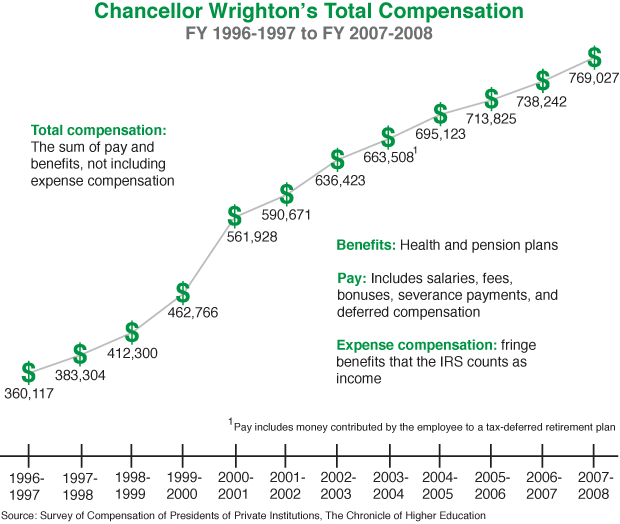Administration | News
The rising price of university presidents

(Brittany Meyer | Student Life)

The median compensation of private university presidents increased 5.5 percent in the 2007-2008 fiscal year, up to $627,750, according to The Chronicle of Higher Education’s annual executive compensation survey. The survey’s data came from federal tax documents released before the economic downturn. In light of the economy, many private university presidents have frozen their salaries or, in the case of Washington University Chancellor Mark Wrighton, taken voluntary pay cuts.
The CHE survey, which included the presidents of 419 colleges and universities, found that the median pay of private university presidents in 2007-2008 was $358,746, a 6.5 percent increase from the previous year. Pay is defined as salaries, fees, bonuses, severance payments and deferred compensation. Compensation is defined as pay plus benefits, which include health and pension plans.
Over the previous five years, the median presidential pay, adjusted for inflation, grew by 14 percent.
To explain the nationwide increase in college presidents’ pay and compensation, Wrighton said that presidents’ salaries reflect the increasingly demanding and complex nature of their jobs. Wrighton said high salaries are necessary to attract talented leaders qualified for the position.
Wrighton predicted that the trend of increasing presidential salary will continue after the economy recovers.
Wrighton’s total pay was $539,250 in 2007-2008, according to the survey. His total compensation in 2007-2008, including benefits, was $769,027. The chancellor’s total compensation more than doubled between 1997-1998 and 2007-2008.
Last November, Wrighton announced he would voluntarily take two 5-percent pay cuts from his base salary to compensate for the University’s shrunken endowment. The first pay reduction went into effect on Jan. 1 and the second on July 1.
Amid the economic hardship, Wrighton said he considers his pay cut an “important symbol” of sacrifice.
“By indicating that I would be taking a pay reduction, this helps people understand the seriousness of the circumstance that we were facing,” Wrighton said.
Chancellor Wrighton is not alone in his symbolic gestures. Other top University officials, including school deans and vice chancellors, volunteered to have no increase in their compensation in 2009. High-ranking officials at other institutes of higher education have also taken pay cuts.
For example, John Hennessey, president of Stanford University, announced last December that he would take a 10 percent pay reduction from his base salary of $700,000.
With the recent signs of economic recovery, however, Wrighton said he looks forward to unfreezing the increases in compensation for administrators, faculty and staff as a means of rewarding their dedication to the University.
“I’m hoping that we’ll be able to move on to a situation where we see strong enough an economy where we can increase compensation,” Wrighton said. “We’ll be monitoring the economic situation very carefully and try to determine how best to reward the outstanding faculty and staff that we have at the University.”
Although many students were surprised by the magnitude of Wrighton’s salary, many believe it to be a legitimate compensation for his contributions to the University.
“I had no idea how much the chancellor made, but I’m sure that he deserves his salary,” freshman Elizabeth Fang said.
Others responded with more reservations.
“I have no idea what Chancellor Wrighton does on a daily basis,” freshman Allison Brenner said. “He only deserves such a high salary if his responsibilities merit it.”
